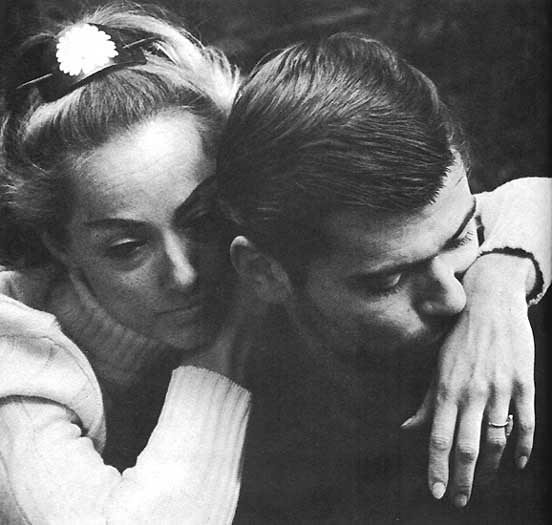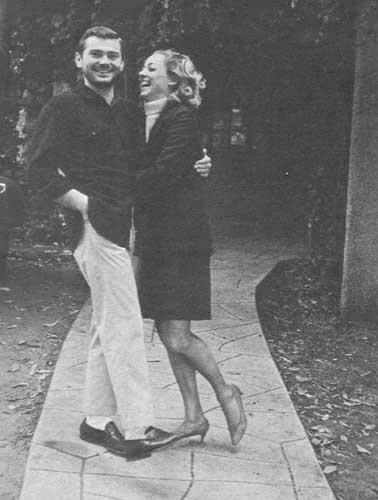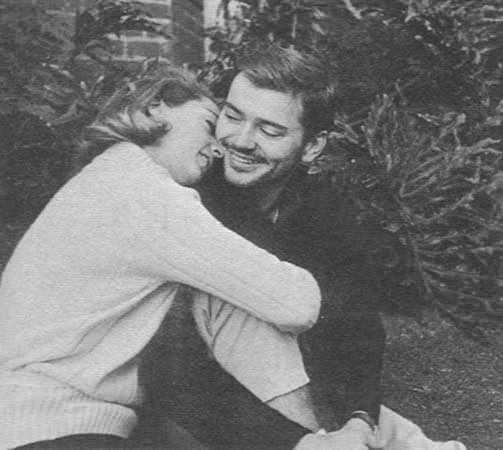by Dora Albert
 With
startling candor, Peter reveals why he won't marry Jill Andre,
the lovely divorcee he admittedly loves.
With
startling candor, Peter reveals why he won't marry Jill Andre,
the lovely divorcee he admittedly loves.
 With
startling candor, Peter reveals why he won't marry Jill Andre,
the lovely divorcee he admittedly loves.
With
startling candor, Peter reveals why he won't marry Jill Andre,
the lovely divorcee he admittedly loves.
However, Peter recently admitted that for the past year-and-a-half, he has been deeply in love with one woman--the lovely, sandy-haired, blue-eyed actress and former model, Jill Andre. Jill is a divorcee who lives in a pleasant cottage in West Hollywood with her two children, a boy and a girl.
The dimple on Peter's left cheek flashed as he told me, "Yes, Jill and I are in love. But we have no marriage plans."
"Why not?" I asked. "After all, she is divorced."
"That's it," he said. "You said it. She's divorced. It would be silly for her to jump out of one divorce into another marriage; we both feel that way. Then too, quite frankly, knowing myself, I feel that I am not emotionally ready to be married. I'm not ready to totally commit myself to marriage.
"Of course if I were to get married to Jill, I would see that her children were taken care of, but I'm not prepared for the other responsibilities of marriage. If I were married I'd resent being tied down; I would either be gadding about or wanting to gad about.
"Some men are ready for marriage at 22. At 26, I'm not. There's such a bloody pressure on people--particularly in my business--to get married. 'When are you going to get married?' everyone's always asking. I may never get married ... who knows? Anyway, I have a feeling that I won't get married for at least three or four years. That could change, but I'm sure I'll get married only when I feel ready.
"Jill herself has put no pressure on me. At this point, she is no more eager to rush into marriage than I am. She has the experience of an unhappy marriage to look back on; that may have made her cautious."
Peter and Jill have known each other for about three years. When they first met, he was dating another girl who used to board with Jill and her husband, director Richard Franchot. Calling on this other girl, Peter met Jill and her husband. Both liked Peter, and Peter liked them; the three became fast friends.
 Peter's
romance with the boarding girl ended a few months later, but his
friendship with the Franchots continued. "I continued to
see the Franchots socially," he said, "but I had my
own girl friend," who changed from time to time, but was
always either a delectable-looking blonde, brunette or redhead.
Peter's
romance with the boarding girl ended a few months later, but his
friendship with the Franchots continued. "I continued to
see the Franchots socially," he said, "but I had my
own girl friend," who changed from time to time, but was
always either a delectable-looking blonde, brunette or redhead.
Photo Caption: Jill and Peter are always together, and it's plain to see they're as close as two unmarried people can be!
Peter told me, "Jill and I didn't become involved with each other until after she and her husband were in the process of getting a divorce. While we were just friends it became obvious to me that things weren't working out in their marriage.
"In the beginning I'd had no real reaction to Jill. She was so thoroughly ensconced in her role as the mother of a three-year-old girl, Gabriel, and a one-year-old boy, Pascal, I never thought of anything but friendship between us. "
Richard, Jill and I were all friends; close friends find out about each other. No one broke the news that they were having problems to me with any specific statement like, 'We may have to get a divorce.' I was a part and parcel of their problems because I was a close friend. They both confided in me. Well, Jill did so more than her husband, but we were close friends, all three of us; it was not Jill and me against her husband, so please don't write it that way."
Peter looked directly at me, his brown eyes searching my face for some assurance that I wouldn't double cross him. I assured him I wouldn't.
He went on, "Richard, Jill and I worked together in some education shows for Columbia College in California. Her husband directed them--Jill and I acted in them. We did one called "The Case of the Crushed Petunias," a Tennessee Williams one act play about a vital, lively young man who meets a mousy, withdrawn young woman who runs a little antique shop. Well, the vital young man brings out the best in her; he brings out the woman in her."
He paused abruptly and looked at me sharply, but with a twinkle in his eyes. "Ah," he said, the dimple in his cheek flashing again, "you're going to draw an interesting analogy, aren't you?"
It is obvious that Peter has brought out the woman in Jill. When I said to him that Jill probably looks so beautiful because she's so much in love, he responded very honestly, "That's probably it. And I'm very deeply in love with her."
"People who don't know Peter well are astonished that he has fallen in love with a divorcee with two children, when he could get all the pretty 20- year-olds he can flash a wicked dimple at. Jill isn't 20; acquaintances believe she's closer to 30. So why is Peter so fascinated by her? Could it be the infatuation of a young man of 26 with a woman a few years older than himself?
Peter looked indignant. "It's not an infatuation," he said. "It's been going on too long for that.
"I have at times been involved with women much older than Jill. Many young men become involved with women in their late thirties and early forties. Jill is not much older than I--so she doesn't have that kind of appeal for me. If you could see Jill, you'd think she was the same age as I or younger. A few nights ago we were at a pizza stand with her two children. A fellow behind the counter asked me, 'Are those your kids?' I said, 'No, they're not mine, they're hers.' He looked incredulous. He said, 'Are you kidding? She doesn't look old enough to have children."'
The romantic involvement of Peter and Jill occurred only after he knew that her marriage had gone to pieces. "Her ex-husband and I have never had any argument about my romance with Jill. Dick and I have remained friends. We saw each other only this afternoon. Actually, it was not a case of one person leaving the other, and the other wanting the two of them to stay together. Their divorce was a mutual decision.
"As a friend, I was sad when I saw
their marriage wasn't working, but I didn't try to bring about
a reconciliation. I've been through enough romantic entanglements
to know when two people are able to reconcile and when they're
not. I was aware, as were Dick and Jill, that there was not going
to be any reconciliation. It was not a matter of reconciling two
people unable to live together from the stand-point of peaceful
co-existence. Rather, it was a case of two people who wanted to
go their separate ways. They probably could have co-existed peacefully
on the surface, but all sorts of problems arise that way. Marriages
where a husband and wife stay together just to maintain an image
are destructive to them and to their children. If parents remain
with each other, allied in that kind of a marriage, there is always
an undertone of hostility.
"But when two mature, intelligent adults like Jill and Dick decide on a divorce, their children are told what they have to know and given honest explanations. I know for a fact that Gabriel and Pascal are healthier emotionally than the children of those parents who stay together out of some Puritan, out-of-proportion sense of duty to their children. Many couples who stay together for their children eventually hurt the children; it's harmful to a child to live in an atmosphere filled with undercurrents of tension and hostility.
Photo Caption: Peter says his love for Jill is "not an infatuation."
"Gabriel and Pascal are delightful children; the divorce has had no traumatic effect on them. They have accepted me; they also accept discipline from me, when Jill and I feel they need it.
"I don't want you to get the feeling that I'm a fifth wheel in the family. Jill and I have been going together for a year and a half. Even before that, the children were used to seeing me around the house, because of my friendship with both their parents. When their parents separated, they were saddened by the idea that their father and mother wouldn't be living together any more, but they adapted to the situation."
They accept Peter as the man in Jill's life, a man who loves them as well as their mother.
When their father isn't with them, they see nothing unacceptable in the fact that Peter may be called upon to discipline them.
Said Peter, "You don t have to restrict the disciplining of children to a given number of people, as long as those who discipline them are in accord on the method. We never spank them except when they get way out of line. And even then, they never get a spanking as such; it's such a barbaric custom when you take a child and hit him four or five times. Pascal and Gabriel get one good whack if they really step out of line, after having been warned a couple of times. They probably each get an average of only a whack a month. They're very well behaved and very spontaneous."
Even before he fell in love with Jill, Peter sympathized with her because of the difficult situation she faced. He didn't take sides; he knew too well the painful decision his friends were facing. He admired the way they both handled the situation and themselves. He knew how devoted they were to the children.
"The prime consideration in this divorce was the children," said Peter. "Richard and Jill had many honest discussions. They wanted to be sure that they were doing what was best not only for themselves but also for Pascal and Gabriel. They didn't rush into the divorce. Neither of them ever stormed out of the house in a tantrum; they didn't do anything impulsively. It was a thing they deliberated about for a long, long time. They spent all their knowledge and a year of their time considering the matter before they took a step. They finally made their decision, and got the divorce in such a way that everyone has come out smelling like a rose.
"And the children are the happiest I've ever met. They aren't torn between their parents. They see their father throughout the week and spend most of their weekends with him. Sometimes Jill and I will be going out and Richard and his girl friend will come over and babysit. At other times when we're going some place we'll drop the kids at Richard's place. Sometimes Dick will call up and say, 'I'm free on such and such a date. Are you planning anything with the kids?' If you're not, I'd like to have them. And we say, 'Fine. Sure.' We work things out like civilized human beings. The youngsters know that we all love them, and there is none of the terrible feeling that children have who are being fought over."
What first awakened Peter and Jill to the fact that there was an electricity between them that might mean more than friendship?
Peter stopped and thought for a moment. Then he said quite seriously, "What first attracted me was her spontaneity, her great open-faced enjoyment of things. Jill has a wide range of appreciation. We go to dinner and the movies together; we also go to baseball games. We both like good books and good music--everything from present day folk rock to classical music and opera. Sometimes we both go skiing.
"But whether we're skiing in the snow or romping in the sun or just cueing each other on lines in a TV show, we enjoy being together; we're together during almost all our free time.
"Before I fell in love with Jill I wasn't the most faithful guy in the world. I run the straight and narrow with her now. When we were first going together--well, let me put it this way--there have been periods in our relationship when I was less faithful than I am now.
"When I do get married, I definitely hope it will be to Jill or a girl like her. As a matter of fact, I have a hard time imagining marrying anyone but Jill because of what she is and what she means to me. I found that out very quickly the two or three times we broke up. Once we had what you might call a trial separation for three or four weeks. The reason we had broken up was like the reason I don't want to get married yet--I was starting to get itchy feet; I was getting restless. It didn't seem wise to be seeing just one girl when we didn't plan on getting married. I stayed away from Jill for a few very lonely weeks. Oh, I took out other girls, and I enjoyed being with them up to a point, but they couldn't supply the companionship Jill does."
His eyes took on a reminiscent glow. "I just couldn't help comparing them with Jill, and they just didn't compare. I was terribly unhappy without her. I couldn't take the separation, and we got back together again.
"However, I think it would be stupid for me to marry now, when I'm not emotionally ready. I would make a miserable mess of marriage right now, I'm afraid," Peter said, the smile fading from his face. Then he grinned broadly again. "Of course it's possible I might not. Maybe the marriage would succeed, but"--again the smile faded--"I'm not willing to take the risk.
"I'm not saying we're perfectly contented with the present situation. If we were married, Jill would never be perfectly contented; neither would I. I don't believe that anyone is ever perfectly contented in any situation. That's a fact of life we have to accept. Thinking otherwise is what goofs up kids who get married young thinking once they get married all their troubles will go away, that marriage will solve all their problems."
Dick [sic, obviously this should be Peter] and Jill are wise enough to know what the problem would be if they did get married. As long as Dick [sic, again Peter] feels that he's not emotionally ready for marriage, he isn't.
Meantime, they have a groovy romance,
and for now it seems to be enough just knowing they've found love.
Back
to Articles List